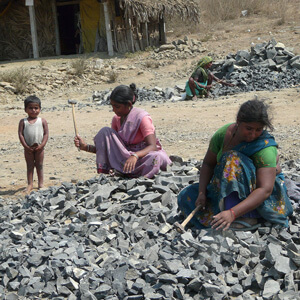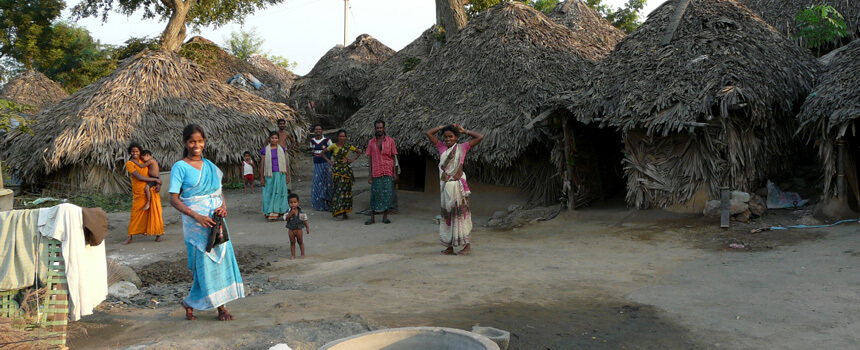 Kluge Köpfe statt wunde Hände|Clever minds instead of sore hands
Kluge Köpfe statt wunde Hände|Clever minds instead of sore hands
Durch Bildung Kinderarbeit in Indien verhindern|Combatting child labor through education in India
Was haben Grabsteine, Terrassenfließen, Tischplatten und Pflastersteine gemeinsam? Sie sind aus Granit und dieser kommt mit großer Wahrscheinlichkeit aus Indien. Die Arbeitsbedingungen in indischen Steinbrüchen sind unzumutbar. Schutzvorrichtungen oder Schutzkleidung wie geschlossene Schuhe, Helme oder Staubmasken gibt es nicht. Die Löhne sind gering, werden unregelmäßig oder oft auch gar nicht bezahlt. Wegen der körperlichen Belastung und den gesundheitlichen Risiken, sind es meist Tagelöhner aus diskriminierten Gruppen, die in Steinbrüchen arbeiten. Weil das Geld zum Überleben nicht reicht, müssen ihre Kinder oft mitarbeiten. Diese Kinder haben keine Chance eine reguläre Schule zu besuchen und wenn doch, fehlen sie oft, weil sie arbeiten müssen. Die Kinder haben keine Zukunft, und der Teufelskreis aus Not und Diskriminierung wird nicht durchbrochen.|What do gravestones, terrace tiles, table tops and paving stones have in common? They are made of granite and that is most likely from India. Working conditions in the stone quarries of India are intolerable. Safety measures or protective clothing such as closed shoes, helmets or dust masks do not exist. Wages are low, and paid irregularly - or not at all. Because of the physical stress and the health risks, most of the day laborers who work in the quarries belong to discriminated groups. Because the money hardly lasts to survive, their children often have to work as well. These children have no chance to attend a regular school, and if they do, they often miss class because they have to work. They have no future, and the vicious circle of poverty and discrimination can't be broken.
Necessity
Bildung für Kinder, die in den Steinbrüchen von Gowripatnam, Indien, arbeiten müssen.|Education for children who have to work in the quarries of Gowripatnam in India.
Activity
Vorschulen bereiten Kinderarbeiter in Indien für den Besuch von staatlichen Schulen vor und schaffen Zukunftschancen durch Bildung.|Pre-schools prepare child laborers in India for attending public schools and create opportunities for the future through education.
Countable effort
Anzahl der Kinder im Alter von 4 bis 14 Jahren, die eine der 5 Vorschulen von Gowripatnam besuchen und hier auf die regulären Schulen vorbereitet werden.|Number of children aged 4 to 14 years that attend one of the 5 pre-schools in Gowripatnam, India, and that are prepared for attending regular schools.
Result
Jedes Jahr werden zwei Drittel der Schüler in staatliche Schulen integriert und weitere 100 Kinder werden von den 5 Vorschulen aufgenommen.|Each year, two-thirds of the students are integrated into public schools and another 100 children are accepted by one of the 5 pre-schools.
Systemic effect
Kinder von Tagelöhnern bekommen die Chance auf Bildung. Die Eltern lernen ihre Rechte und die Vorteile von Bildung kennen. Kinderarbeit geht zurück.|Children of day laborers are given the chance to education. Parents learn about their rights and about the benefits of education. Child labor is declining.
Background
Kinderarbeit ist in Indien ein weitverbreitetes Phänomen. Armut und extreme gesellschaftliche Ausgrenzung von stigmatisierten Gruppen sind hierfür die wesentlichen Gründe. Die indische Regierung schätzt die Zahl der Kinder, die arbeiten müssen auf knapp 4 Millionen, die Dunkelziffer dürfte deutlich höher sein. Sie stammen vorwiegend aus niedrigen Kasten oder sind kastenlose Dalits (UNICEF, 2008), die besonders stark diskriminiert werden. Viele Kinder arbeiten in Bergwerken unter unzumutbaren Bedingungen (US Dept. of Labor, 2012). Alleine der Staub verursacht gefährliche Krankheiten wie Tuberkulose. Obwohl Kinderarbeit verboten ist, schauen die Behörden oft weg und tolerieren damit stillschweigend diese Missstände. Wie in den Granitminen von Gowripatnam. Keiner kontrolliert, ob die Kinder zur Schule gehen. Die Eltern, selbst oft Analphabeten, wissen nicht um die Wichtigkeit von Bildung. Obwohl laut indischer Verfassung jeder das Recht auf Bildung hat, sind über ein Drittel der Erwachsenen über 15 Jahren Analphabeten und jeder zweite Schüler im Alter von 8-11 Jahren kann nicht Lesen (Drèze, Sen 2014). Nur durch gezielte Förderung der Kinder in Gowripatnam können sie ihrem scheinbar vorbestimmt Schicksal entkommen.|In India, child labor is a widespread phenomenon. A major reason are poverty and the social exclusion of stigmatized groups. According to estimates of the Indian government, nearly 4 million children are forced to work. However, given that the informal sector is rife with invisible child laborers, this figure is believed to be significantly higher. The children mostly belong to lower castes or are casteless Dalits, who are particularly vulnerable to discrimination (UNICEF, 2008). Many children work in mines under unacceptable conditions (US Dept. of Labor, 2012). The dust causes dangerous diseases such as tuberculosis. Although child labor is prohibited, the authorities usually look the other way and often tacitly tolerate the abuse. This is also the case in the granite mines of Gowripatnam. No one checks whether the children go to school. The parents are often illiterate, and do not understand the importance of education. Even though everyone has the right to education according to the Indian Constitution, more than one-third of the adult population (aged 15 and older) are illiterate, and one in two students aged 8-11years cannot read (Drèze, Sen 2014). Only through the targeted support of children in Gowripatnam, they can escape their seemingly predestined fate.
The good deed
Bildung statt Steinbruch, diesem Anliegen hat sich die ASW-Partnerorganisation AWARD verschrieben. In speziellen Vorschulen lernen die Kinder im Alter von 4 bis 14 Lesen, Schreiben, Englisch und die Regionalsprache Telugu. Auch Erziehung zur Sauberkeit und Konzentrationsübungen stehen auf dem Programm. So werden sie für den Besuch einer staatlichen Schule vorbereitet und bekommen eine Chance auf Bildung. Um die Eltern von der Notwenigkeit von Bildung zu überzeugen, leistet AWARD regelmäßig Aufklärungsarbeit. Der Schulbesuch ist kostenlos. Als zusätzlicher Anreiz wird eine medizinische Grundvorsorge der Kinder angeboten, die sich die Familien sonst nicht leisten können. Langfristig soll die Kinderarbeit in Gowripatnam beseitigt werden. Dafür bedarf es kontinuierlicher Aufklärung und Stärkung der Eltern, enge Zusammenarbeit mit lokalen Behörden und Vorschulen, die auf die jeweiligen Bedürfnisse der Kinder eingehen.|School instead of mines. That is the motto of ASW's partner organization AWARD. In special pre-schools, children aged 4 to 14 learn to read and write, English and the regional language Telugu. Hygiene trainings and concentration exercises are also part of the program. In that way, the children are prepared to attend a public school and get the opportunity to receive an education. In order to convince the parents of the necessity of education, AWARD conducts awareness raising campaigns. School attendance is free. As an additional incentive, the children are provided with primary healthcare - something that families would not be able to afford otherwise. In the long term, the aim is to abolish child labor in Gowripatnam. This requires continuous education and strengthening of the parents, working closely with local authorities and pre-schools that can meet the needs of the children.
Challenge
Die Eltern vieler Kinderarbeiter sind Analphabeten und wissen nicht um die Vorteile von Bildung. Durch gezielte Aufklärungsarbeit werden sie von der Wichtigkeit des Schulbesuchs überzeugt.|The parents of many child laborers are illiterate and often do not know about the benefits of education. Through awareness raising campaigns they are convinced of the importance of school attendance.

AboutIndien|India
Neu Delhi|New Delhi
Capital
1 252 139 600|1 252 139 600
Number of inhabitants
1 627 USD|1 627 USD
Gross domestic product per capita per year
135|135
Human Development Index
Nach Schätzungen des IWF entwickelt sich Indien hin zur am schnellsten wachsenden Wirtschaft der Welt. Trotzdem leben 30% der Inder unterhalb der Armutsgrenze (1 USD pro Tag). Fast 70% müssen mit weniger als 2 US-Dollar pro Tag auskommen. Besonders gefährdet sind dabei Minderheiten, wie die kastenlosen Dalits.|According to IMF estimates, India is developing into the fastest growing economy in the world. Nevertheless, 30% of Indians live below the poverty line (1 USD a day). Nearly 70% live on less than 2 USD a day. Particularly vulnerable are minorities, such as the outcaste Dalits.
About the organization and further information
Association
Aktionsgemeinschaft Solidarische Welt e.V.|Aktionsgemeinschaft Solidarische Welt e.V.
Initiative Transparente Zivilgesellschaft, DZI- Spendensiegel|Transparency International, DZI - Seal of Approval
Further information and source
- http://www.refworld.org/docid/50659416d.html
- https://www.unicef.at/fileadmin/media/Infos_und_Medien/Info-Material/Kinderarbeit/Kinderarbeit-Grundsatzpapier_neu__2008__01.pdf .
- http://labour.nic.in/content/division/child-labour.php
- Jean, D. und Amartya, S. (2014). Indien. Ein Land und seine Widersprüche. C.H. Beck Verlag, München.
- www.aswnet.de
- http://www.aswnet.de/en.html
- https://www.perlentaucher.de/buch/jean-dreze-amartya-sen/indien.html
- http://labour.nic.in/content/division/child-labour.php
- https://www.unicef.at/fileadmin/media/Infos_und_Medien/Info-Material/Kinderarbeit/Kinderarbeit-Grundsatzpapier_neu__2008__01.pdf
- http://www.refworld.org/docid/50659416d.html




